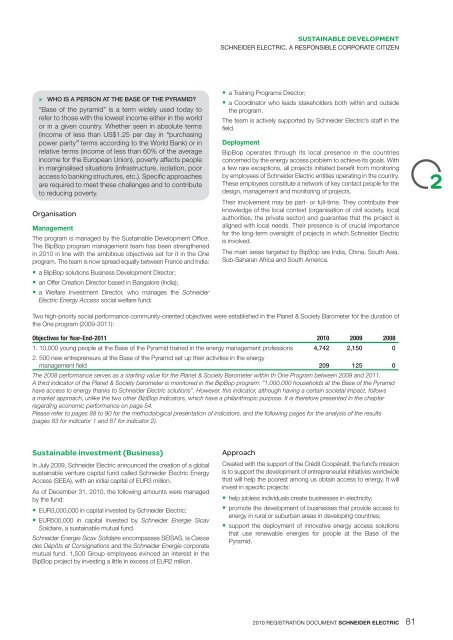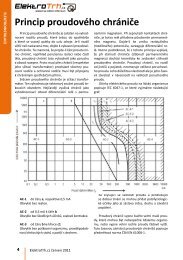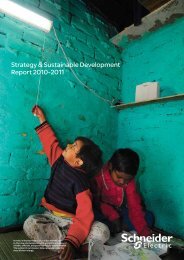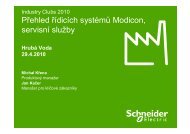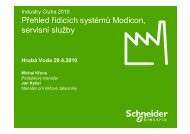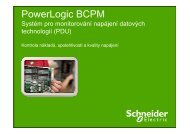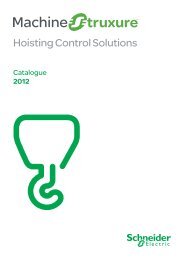2010Annual Report - Schneider Electric CZ, s.r.o.
2010Annual Report - Schneider Electric CZ, s.r.o.
2010Annual Report - Schneider Electric CZ, s.r.o.
Create successful ePaper yourself
Turn your PDF publications into a flip-book with our unique Google optimized e-Paper software.
WHO IS A PERSON AT THE BASE OF THE PYRAMID?<br />
“Base of the pyramid” is a term widely used today to<br />
refer to those with the lowest income either in the world<br />
or in a given country. Whether seen in absolute terms<br />
(income of less than US$1.25 per day in “purchasing<br />
power parity” terms according to the World Bank) or in<br />
relative terms (income of less than 60% of the average<br />
income for the European Union), poverty affects people<br />
in marginalised situations (infrastructure, isolation, poor<br />
access to banking structures, etc.). Specifi c approaches<br />
are required to meet these challenges and to contribute<br />
to reducing poverty.<br />
Organisation<br />
Management<br />
The program is managed by the Sustainable Development Offi ce.<br />
The BipBop program management team has been strengthened<br />
in 2010 in line with the ambitious objectives set for it in the One<br />
program. The team is now spread equally between France and India:<br />
• a BipBop solutions Business Development Director;<br />
• an Offer Creation Director based in Bangalore (India);<br />
• a Welfare Investment Director, who manages the <strong>Schneider</strong><br />
<strong>Electric</strong> Energy Access social welfare fund;<br />
SUSTAINABLE DEVELOPMENT<br />
SCHNEIDER ELECTRIC, A RESPONSIBLE CORPORATE CITIZEN<br />
• a Training Programs Director;<br />
• a Coordinator who leads stakeholders both within and outside<br />
the program.<br />
The team is actively supported by <strong>Schneider</strong> <strong>Electric</strong>’s staff in the<br />
fi eld.<br />
Deployment<br />
BipBop operates through its local presence in the countries<br />
concerned by the energy access problem to achieve its goals. With<br />
a few rare exceptions, all projects initiated benefi t from monitoring<br />
by employees of <strong>Schneider</strong> <strong>Electric</strong> entities operating in the country.<br />
These employees constitute a network of key contact people for the<br />
design, management and monitoring of projects.<br />
Their involvement may be part- or full-time. They contribute their<br />
knowledge of the local context (organisation of civil society, local<br />
authorities, the private sector) and guarantee that the project is<br />
aligned with local needs. Their presence is of crucial importance<br />
for the long-term oversight of projects in which <strong>Schneider</strong> <strong>Electric</strong><br />
is involved.<br />
The main areas targeted by BipBop are India, China, South Asia,<br />
Sub-Saharan Africa and South America.<br />
Two high-priority social performance community-oriented objectives were established in the Planet & Society Barometer for the duration of<br />
the One program (2009-2011):<br />
Objectives for Year-End-2011 2010 2009 2008<br />
1. 10,000 young people at the Base of the Pyramid trained in the energy management professions<br />
2. 500 new entrepreneurs at the Base of the Pyramid set up their activities in the energy<br />
4,742 2,150 0<br />
management fi eld 209 125 0<br />
The 2008 performance serves as a starting value for the Planet & Society Barometer within th One Program between 2009 and 2011.<br />
A third indicator of the Planet & Society barometer is monitored in the BipBop program: “1,000,000 households at the Base of the Pyramid<br />
have access to energy thanks to <strong>Schneider</strong> <strong>Electric</strong> solutions”. However, this indicator, although having a certain societal impact, follows<br />
a market approach, unlike the two other BipBop indicators, which have a philanthropic purpose. It is therefore presented in the chapter<br />
regarding economic performance on page 54.<br />
Please refer to pages 88 to 90 for the methodological presentation of indicators, and the following pages for the analysis of the results<br />
(pages 83 for indicator 1 and 87 for indicator 2).<br />
Sustainable investment (Business)<br />
In July 2009, <strong>Schneider</strong> <strong>Electric</strong> announced the creation of a global<br />
sustainable venture capital fund called <strong>Schneider</strong> <strong>Electric</strong> Energy<br />
Access (SEEA), with an initial capital of EUR3 million.<br />
As of December 31, 2010, the following amounts were managed<br />
by the fund:<br />
• EUR3,000,000 in capital invested by <strong>Schneider</strong> <strong>Electric</strong>;<br />
• EUR500,000 in capital invested by <strong>Schneider</strong> Energie Sicav<br />
Solidaire, a sustainable mutual fund.<br />
<strong>Schneider</strong> Energie Sicav Solidaire encompasses SEISAS, la Caisse<br />
des Dépôts et Consignations and the <strong>Schneider</strong> Energie corporate<br />
mutual fund. 1,500 Group employees evinced an interest in the<br />
BipBop project by investing a little in excess of EUR2 million.<br />
Approach<br />
Created with the support of the Crédit Coopératif, the fund’s mission<br />
is to support the development of entrepreneurial initiatives worldwide<br />
that will help the poorest among us obtain access to energy. It will<br />
invest in specifi c projects:<br />
• help jobless individuals create businesses in electricity;<br />
• promote the development of businesses that provide access to<br />
energy in rural or suburban areas in developing countries;<br />
• support the deployment of innovative energy access solutions<br />
that use renewable energies for people at the Base of the<br />
Pyramid.<br />
2010 REGISTRATION DOCUMENT SCHNEIDER ELECTRIC 81<br />
2


